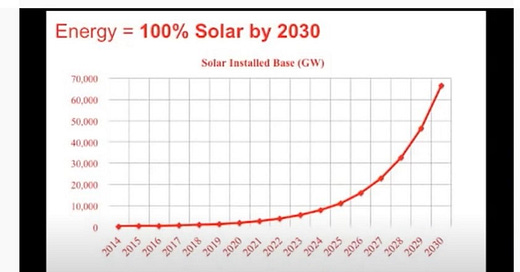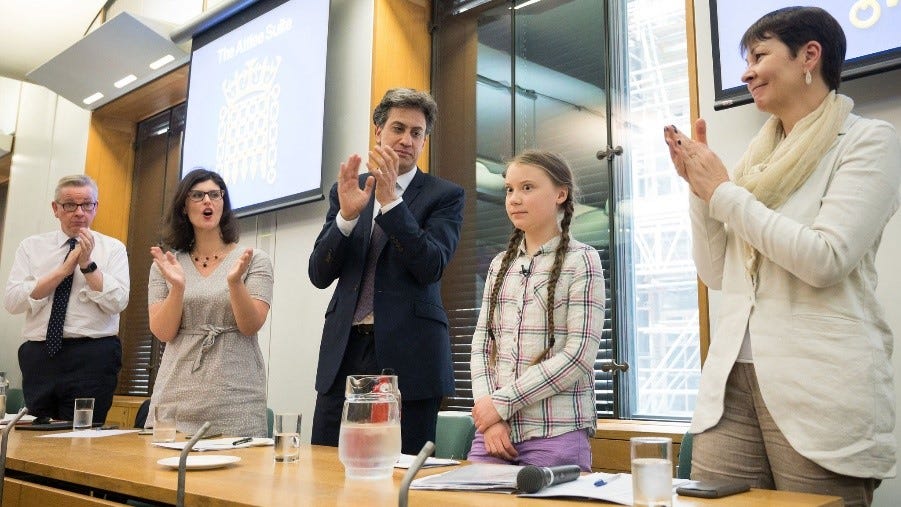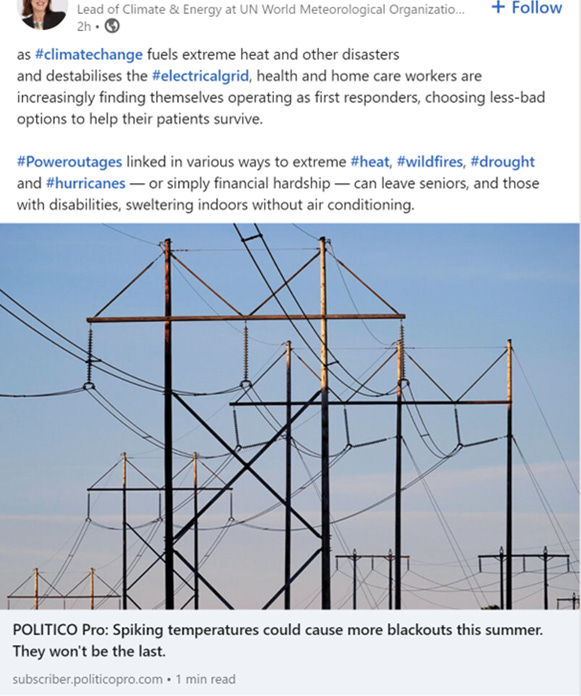Never Mind The B*ll*cks, Here's The Merchants of Boom
Fame, social status, fortune - and consequences for the rest of us.
Eight years ago, someone quite influential postulated that the world would be running 100% on solar energy “by 2030”. I didn’t believe it then, and I’m not holding my breath now with eight years to go... This world-view was clearly bollocks yet it was greeted with rapturous applause, easy-acceptance and indeed huge indulgence. It was what people wanted to hear. It was contextualized as a simple thought-extrapolation “IF solar continues with a CAGR of 43%, THEN” – but the damage was done – expectations were set. The sunlit uplands were within reach.
Blame Bill Gates
Firstly – how can you get to the conclusion that solar will power the world’s energy within a year? The answer is simple – use a spreadsheet and let the magic of compound growth do the rest. Don’t worry about mining, manufacturing, cost or anything – just compound away until you get your desired outcome. Set 16 years as your goal, and back-calculate that a mere 43% compound GR will do the trick.
So, the lesson here is, if you want to get to 100% renewables, it is easy - use a spreadsheet.
Costs coming down – lets extrapolate forever; need an extra 200GW of wind, lets pop that into cell G23.
In the real world the 100% renewable objective is desperately hard, probably impossible for 7.8bn people, and will be so thermodynamically impoverishing that people will die en masse long before we get there.
Bill Gates gets a lot of bad press so, as the energy transition accumulates its “unintended consequences” I’ll just go with the flow and blame Bill Gates. (Although it was recently pointed out to me that Excel was by no means the first spreadsheet – so maybe I am being doubly unfair).
The Bermuda Triangle
Meanwhile, somewhere in the Bermuda Triangle of Energy Economics and Physics, some people are very, very lost: “Inflation is transitory”, printing money has no consequences, energy is a commodity, loan poor people money to bridge the energy price spike, levy windfall taxes, make high prices illegal (I kid you not!) etc.
Are these people stupid?
A good rule when you travel is that when you see something that looks dumb, you should try and understand the “why” rather than assume people are plain stupid. Every house in the town is unfinished – why? Maybe access to capital, maybe municipal taxes only apply to finished houses… who knows. But there will be a reason, it’s just that this reason won’t fit within your framework.
Likewise with people in power we should try to understand that their pronouncements and decisions are a function of an overall framing. Part of that will be the short-termism of politics and the desire to stay in power, part of the framing will be a much bigger ideological framework.
The first of these, policy as a vote-winner or simple deflection/distraction is obvious. The UK enshrined its Net-Zero aspirations into law at the time of Peak Greta – an easy vote winner (but one that has major consequences that will fall due much later).
Equally, the recent announcement of a windfall tax on oil and gas companies in the UK was suspiciously coincidental with the publishing of the Partygate report, which was then conveniently pushed off the front pages.
The second is the bigger ideological framework which has many characteristics, but notably it sees energy as just another commodity like pork-bellies, tobacco or smart-phones; and it has a myopic focus on the carbon molecule to the exclusion of all else.
This combination leads to the facile and simplistic view that legacy sources of energy are just “bad” and at the same time, easily replaceable. It enables a set of heuristics that allow the holder to see only the negative side effects, the externalities and be wilfully blind to the positives.
The short-term populism and the ideological framework can combine, as per the UK example above, or more recently by the move of the current US administration to “make it illegal to increase gas and home energy prices in a “exploitative manner”. This proposed legislation is unlikely to pass, but I almost hope it does – because I’d love to see how that would work in practice. The UK tried this on home energy (electricity and natural gas) with a “price cap”; not surprisingly, this has been crushed by reality.
The global energy markets do not care whether the UK has a price cap or not.
If you follow the logic of fixing a maximum price – all that will happen is that you self-ration and have less in a global market.
When you have a hammer
You don’t have to go far to find examples of smart people in various states of anger and outrage as their framework is challenged - for example, that G7 leaders are asking OPEC to pump more oil. This request is partly to offset the toxic Russian crude, but I suspect many realize that more supply will tame the price inflation issue (see “desire to stay in power” above), and Russia is useful political cover.
As we can see from the image above – a smart, concerned person is asking a legitimate question (if we ignore the anthropomorphising of “the economy”): “At a time when the economy has recognized and is attempting to transition to a low carbon economy, does it really make sense to produce more oil.” If your frame of reference is Climate Apocalypse – the answer is simple and obvious. No, of course not.
However, one could use the same formulation and ask “At a time when food scarcity is impacting prices, the cost of fertilizer is rocketing (which will really show up in food prices next year) and overall energy costs are squeezing every aspect of the economy, does it really make sense to not produce more oil and gas to mitigate the coming global recession and famine?”. I am genuinely curious to know how this question looks from the perspective of the climate-emergency/crisis crowd.
However, I would guess that for those who are entrenched (and yes, I will be called this and worse) the end-of-the world narrative of climate change will trump even the clear and present danger of global poverty and famine.
As Doomberg said – “I sincerely hope I am wrong about the coming famine” – but if not, ask yourselves, will we see famines caused by energy prices or due to climate change? Which is the clear and present danger? Which is the one we can act on immediately?
If you think that policy (energy or other) isn’t a clear and present danger – than you haven’t been watching Sri Lanka recently.
In another example of “framing” I was just gobsmacked by this one. What is the expression? When you give a child a hammer – everything looks like a nail. It would appear that when you work in a UN Climate role – everything looks like climate.
The massive reduction in reliable baseload through the (perhaps understandable) closure of coal plants and the (incomprehensible) closure of functional nuclear plants, coupled with increased “reliance” on wind and solar is creating well documented fragility in grids across the USA and elsewhere (Europe next).
To suggest that grid-fragility is an outcome of climate change can only be explained by the author being a prisoner of their own framing ecosystem. Seriously, not everything is a nail. Grid fragility has many causes - climate change is not one of them.
The above would be funny of it wasn’t bizarre and dangerous. Scott Adams got there way ahead of this life-imitating-art post above – with the great Dilbert on exactly this issue.
The Road Less Traveled
I have often mused that I must be really dumb to want to talk about energy security and affordability – it would have been a much easier and a much smarter career move to have jumped on the Greener, Cleaner and Cheaper bandwagon – and promoted my brand of easy-energy “solutions” to save the planet. This is a marketing dream – tell people what they want to hear.
The world will be powered by 100% renewable energy with a decade... (ba-da-boom).
Wind and solar are cheaper than any other form of energy in history (whoop whoop).
Big Oil is sitting on trillions of dollars of stranded assets (gloat gloat).
And all of this preached from moral high-ground of saving the planet: repeat after me, “fossil-energy bad, renewable-energy good”. This is for our children…
So why do I not peach the good sermon (apart from a lack of smarts)? – Ironically, because I care about the world that my children will be inheriting. And oh! what irony!
The danger of the “easy transition” snake-oil is the creation of (very) false expectations – and these feed through the lens of media and public opinion into the framework that allows policy makers to suggest things like doubling down on renewables to solve intermittency or banning high prices for internationally traded commodities. It allows people to say things like “with a bit more grid-scale battery capacity” or “by transitioning to the hydrogen economy”, or “it just needs the political will” – platitudes become framing statements, become policy.
So, what gives?
As I have alluded to in this blog – without having to take sides, or agree/disagree with any position – the critical factor we are seeing is a question of timing, of imminence, of clear and present danger.
We are already in the early stages of potentially devastating socio-economic turmoil – energy is the industry that powers all other industry, and it is getting more expensive. Increases in the price of food are noted in the western super-markets and in the inflation figures (despite apparent manipulation to limit this). The price-rationing of food into poorer countries is not newsworthy yet – but as the energy crisis flows into the food crisis (via fertilizer and diesel) – so price induced rationing will occur. “Price induced rationing” sounds benign – but it means that poorer people will simply be out bid and will not be able to buy food. This is economic speak for famine.
Less dramatically, higher energy prices will reduce discretionary household spending in wealthier countries – meaning fewer purchases of stuff and reduced demand from countries dependent on exporting manufactured stuff – leading to layoffs and hardship. This will tank (is already tanking…) share prices of companies who make stuff – and with these, down go your pensions. It will mean factory closures and families losing incomes in workshop countries.
We need reliable, secure and affordable energy – and wind turbines and solar farms are part of that – but in the same way that fossil fuels are seen as being all bad with no positives, so wind and solar are promoted as all good with no negatives. The reality is that a headlong rush to transition will have many unintended consequences. Forecasting “peak oil demand” to fit placate stakeholder activists, declaring that “no new fossil fuels investments are needed” and crusading to divest from fossil-fuels has lead to the supply crunch we are seeing today. Shutting workhorse power-plants with no plan for how to bridge low renewable days/weeks/months destabilizes the electricity grids – and whilst the grid is socially invisible when it works, it is essential to the functioning of any modern economy. Something we only discover when it breaks.
Framing the narrative as an easy transition is dangerous. Reality has a harsh way of reframing the narrative – physics pummels platitudes, and physics is winning, as it always will.









Hehehehe. The Dilbert cartoon is spot on! As for reframing the narrative, how about blaming the Russia’s war in Ukraine for the high oil prices rather than the massive structural imbalances seeded during decades of efforts, perhaps well-intended, to swap the cheapest and most reliable supply of energy for intermittent, grid-expensive “clean” energy that only the well off can afford (“but, please subsidize it, of course”)?